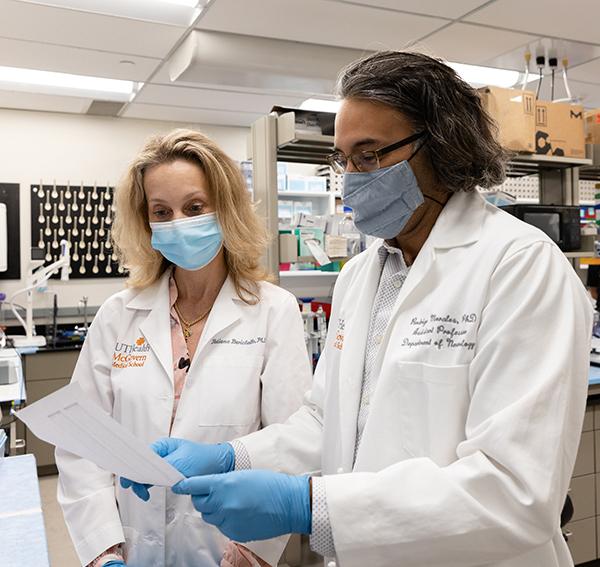
Credit: Rogelio Castro/UTHealth
The role of peripheral and brain infections in the development of Alzheimer’s disease is the focus of new research at The University of Texas Health Science Center at Houston (UTHealth), funded with a $2 million grant from the National Institutes of Health (NIH).
“If we can prove the theory that infection is one of the factors that triggers Alzheimer’s disease, and specifically sepsis and meningitis, we can pay more attention to these diseases and possibly be able to avoid the onset of dementia for people in the long term,” said co-principal investigator Tatiana Barichello, PhD, assistant professor in the Louis A. Faillace, MD, Department of Psychiatry and Behavioral Sciences at McGovern Medical School at UTHealth.
Principal investigator on the preclinical study is Rodrigo Morales, PhD, associate professor in the Department of Neurology at McGovern Medical School at UTHealth.
Morales and Barichello will seek to identify the molecular and cellular mechanisms associated with the role of infection in the development of Alzheimer’s disease with the hope that doctors would be able to identify patients who may have an increased risk of developing the disease based on a prior diagnosis of sepsis or meningitis.
Alzheimer’s disease is a type of dementia that affects memory, thinking, and behavior. The symptoms progress and grow severe enough to interfere with daily tasks. More than 6 million Americans are living with Alzheimer’s disease, according to the Alzheimer’s Association. Factors in development of the disease include genetics, age, family history, general lifestyle and wellness choices, and illnesses and health conditions including heart disease, stroke, and concussion.
Morales said one potential link between infections and the development of Alzheimer’s disease is the activation of the peripheral immune system. Immune response in the brain or peripheral compartments may activate resident immune cells in the brain. Although this event may be beneficial, chronic immune activation or severe acute events may lead to different clinical conditions at short or long terms.
“Imbalance in the immune system may also increase the production of certain proteins that may initiate Alzheimer’s disease,” Morales said.
Another link is the permeability of the blood-brain barrier. “The blood-brain barrier acts as the defense mechanism for the brain allowing certain substances to enter the brain and keeping other substances out, but during an event like an injury or infection, that barrier is compromised, which allows those substances that might be harmful to the brain to enter it. These substances can lead to the buildup of inflammation in the brain, which in turn can lead to the development of Alzheimer’s disease,” Morales said.
The study will use different approaches to analyze the potential role of infection in Alzheimer’s disease. This include the use of transgenic mice, human samples, and novel in vitro techniques. One of them is the protein misfolding cyclic amplification (PMCA) technology.
Barichello and Morales are excited to work with a team of researchers across several different departments at McGovern Medical School on the project.
The PMCA technique being used was developed by Claudio Soto, PhD, professor of neurology at McGovern Medical School and director of the George and Cynthia Mitchell Center for Research in Alzheimer’s Disease and Related Brain Disorders, and has been used previously to study several other diseases including Parkinson’s disease.
Other McGovern Medical School collaborators on the study from the Department of Neurology include Louise McCullough, MD, PhD, professor and chair and the Roy M. and Phyllis Gough Huffington Distinguished Chair of the Department of Neurology; Paul Schulz, MD, professor; and Akihiko Urayama, PhD, associate professor. Rodrigo Hasbun, MD, MPH, professor of infectious diseases in the Department of Internal Medicine is also a collaborator.
Morales, Barichello, Soto, McCullough, Schulz, and Urayama are faculty members of The University of Texas MD Anderson Cancer Center UTHealth Graduate School of Biomedical Sciences.
Felipe Dal Pizzol, MD, PhD, from the Universidade do Extremo Sul Catarinense in Criciúma, Brazil, will also collaborate on the research.
The study was funded by the National Institute on Aging, part of the NIH (grant RF1AG072491).
###
Media Contact
Deborah Lake
[email protected]
Original Source
https:/




